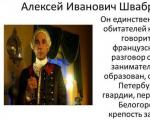Marina Tsvetaeva - Under the caress of a plush blanket: Verse. Girlfriend (Under the caress of a plush blanket)
"Under caress plush blanket» Marina Tsvetaeva
Under the caress of a plush blanket
I call yesterday's dream.
What was it? — Whose victory? —
Who is defeated?I rethink everything again
I'm messing around with everything again.
In what I don't know the words for
Was there love?Who was the hunter? - Who is the prey?
Everything is diabolical!
What I understood, purring for a long time,
Siberian cat?In that duel of willfulness
Who, in whose hand was only the ball?
Whose heart is yours or mine
Did it fly?And yet, what was it?
What do you want and regret?
I don't know if she won?
Is it defeated?
Analysis of Tsvetaeva's poem "Under the caress of a plush blanket"
In the biography of Marina Tsvetaeva, there is one very unusual episode associated with the translator Sofya Parnok. The poetess fell in love with this woman so much that for her sake she left her husband Sergei Efront and moved to live with her new girlfriend along with their little daughter. However, eyewitnesses of those distant events claimed that the two women were connected not just tender friendship, they really were in love, and this novel, unusual for those times, lasted almost 2 years. That the basis of this female friendship there was still love, testifies Tsvetaeva's poem "Under the caress of a plush blanket ...", written in October 1914. For a long time researchers of the poetess's work were convinced that this work was dedicated to Tsvetaeva's secret lover. Indeed, by this moment she had already parted with her husband and settled with Parnok in a rented apartment. However, a detailed analysis of this period in the life of the poetess indicates that it was in October 1914 that the romance between Tsvetaeva and Parnok was in full swing.
Intimacy between two women is fairly common these days, but in pre-revolutionary Russia such relationships were treated extremely negatively. Nevertheless, Marina Tsvetaeva was not afraid to dedicate a poem to her novel, in which she herself wondered who was the leader in this pair, and who got a secondary role? But one thing is certain - Tsvetaeva was truly happy, although she could not fully realize what was happening to her. “I’m all overwhelmed again. In what I don’t know the word for, was there love? ”The poetess asks and does not find an answer. The poetess calls the relationship with Sophia Parnok nothing more than a “battle of willfulness”. But at the same time, she does not know what feelings her chosen one experienced, and whether they were just as sincere and deep. “Whose heart — is it yours or mine — was it flying at a gallop?” the poetess wonders, and over and over again she mentally returns to what she had experienced. And then it is born next question: “I don’t know: did you win? Are you defeated?"
Relationships between women develop a little differently than between partners of the opposite sex. In a romance with a man, everything is simple, because he is assigned the dominant role by default. However, two women, equal in social status And intellectual development, even at very strong mutual feelings will still compete with each other. And it was this thirst for power that eventually led to a break in relations between Tsvetaeva and Parnok, who broke up in 1916 and never met again even by chance.
Brilliant poetess and simply beautiful and wonderful woman Marina Tsvetaeva ... Everyone knows her, first of all, from the verses from the romance, which the main character sings of everyone's favorite film "The Irony of Fate, or Enjoy Your Bath" - "I like that you are not sick of me."
A little about the poet
She is a poet of the XX century, entered the list of authors of the Silver Age. Poems by Marina Tsvetaeva not written plain language, you need to think about them and pass through yourself. She was born in a family where art was in the first place: her mother is a musician, her father is a philologist. Parents from childhood taught the child to music, to literature, to foreign languages that affected the life of the poetess. She became a poet, translator, excellent critic. She spoke fluent German and French, and not only spoke, but also wrote her works. Marina Tsvetaeva received a decent education not only in Russia, but also abroad.
In Moscow, she met local symbolists and herself joined their circle. She witnessed the Civil War, lived through these years with sorrow, and then left Russia for the Czech Republic, where her husband fled after the war. Until 1937, Tsvetaeva was in exile, then returned to her homeland, having survived hunger, illness, many hardships, and the death of her children. The husband was sentenced to death, he was accused of betraying the Motherland, the daughter, as the child of an enemy of the people, was arrested. Unable to withstand all these blows of fate, left alone, Marina Tsvetaeva herself stopped her life. It happened in 1942.
Don't judge a poet by his life
The verse "Under caress she wrote in October 1914. Many, discovering some facts from the life of poets, cease to appreciate their work. "Under the caress of a plush blanket" by Marina Tsvetaeva is included in the cycle of poems "Girlfriend". This cycle is dedicated to a woman who was not just girlfriend of the poetess, it is known that they had a love affair.But we have no right to judge these people.Our task is to read their poems and enjoy them, to take something new for ourselves, but not to judge the actions of poets.

The verse "Under the caress of a plush blanket" is very gentle, timid, but at the same time strong in terms of the strength of feelings that is expressed in it, so you need to read it without thinking about who it was dedicated to.
A poignant and tender poem
Marina Tsvetaeva's poem "Under the caress of a plush blanket" can be read and understood literally. However, it would be more correct to analyze it, looking for and digging out hidden meanings. The lyrical heroine "Under the caress of a plush blanket" by Marina Tsvetaeva "causes yesterday's dream", she is trying to understand what happened. She remembers everything again and again, repeats every word, analyzes every movement to understand what it was, whether it was love. She wants to understand who loved whom, who was the "hunter" and who was the "prey", between whom there was a duel, and who became the winner in it.
Maybe the lyrical heroine, whose thoughts we read in the poem "Under the caress of a plush blanket" by Marina Tsvetaeva, really lies in bed, wrapped in a blanket, and recalls yesterday's dream. But it would be more correct to say that this dream is her life, which passed unnoticed. She had love in her life, or maybe she thought it was love. And this love passed like a dream, it disappeared. The heroine cannot understand why this happened, she remembers everything to the smallest detail.
The rhetorical question at the end of the poem "I still don't know: Did she win? Was she defeated?" shows that she cannot give an answer to this question, and this torments her.

"Cruel romance"
The poem "Under the caress of a plush blanket" by Marina Tsvetaeva is known as a romance from Eldar Ryazanov's film "Cruel Romance". The director did not accidentally choose this particular poem. The main character of the film loves, but does not meet the reciprocal, real and sincere love. Her life is like a dream too. And she can ask herself the question: "Did she win? Was she defeated?"
Are you happy? - Don't tell me! Hardly!
And better - let!
You too many, it seems, kissed,
Hence the sadness.
All the heroines of Shakespeare's tragedies
I see in you.
You, tragic young lady,
Nobody saved!
Are you so tired of repeating love
Recitative!
Cast iron rim on a bloodless hand -
Eloquent!
I love you. - Like a thundercloud
Over you - sin -
Because you are caustic and burning
And best of all
For the fact that we, that our lives are different
In the darkness of the roads
For your inspirational temptations
And dark rock
For what you, my demon with a tough forehead,
I'll say sorry
For the fact that you - at least burst over the coffin! —
Don't save!
For this trembling, for what - that - really
Am I dreaming? —
For this ironic charm,
That you are not him.
Under the caress of a plush blanket
I call yesterday's dream.
What was it? — Whose victory? —
Who is defeated?
I rethink everything again
I'm messing around with everything again.
In what I don't know the words for
Was there love?
Who was the hunter? - Who is the prey?
Everything is diabolical!
What I understood, purring for a long time,
Siberian cat?
In that duel of willfulness
Who, in whose hand was only the ball?
Whose heart is yours or mine
Did it fly?
And yet, what was it?
What do you want and regret?
I don't know if she won?
Is it defeated?
Melted today, today
I stood by the window.
The look is more sober, the chest is freer,
Peaceful again.
I do not know why. Must be
Tired soul,
And somehow did not want to touch
Rebel pencil.
So I stood - in the fog -
Far from good and evil
Drumming softly with your finger
A little tinkling glass.
The soul is not better and not worse,
Than the first comer - this one, -
Than mother-of-pearl puddles
Where the sky spilled
Than a flying bird
And just a running dog
And even a poor singer
It didn't bring me to tears.
oblivion cute art
The soul has already mastered.
Some great feeling
Today melted in the soul.
You were too lazy to dress
And I was too lazy to get out of my chair.
- And each of your coming days
My fun would be fun.
especially bothered you
Go so late in the night and cold.
- And each of your coming hour
My fun would be young.
You did it without evil
Innocent and irreparable.
I was your youth
that passes by.
Today at eight o'clock
Stremglav along Bolshaya Lubyanka,
Like a bullet, like snowball,
Somewhere sleds raced.
Laughter already...
I froze like this:
Hair reddish fur,
And someone tall is near!
You were already with someone else
With her, the sleigh path was opened,
With the desired and dear, -
Stronger than I - desired.
— Oh, je n'en puis plus, j'etouffe* —
You shouted at the top of your voice
Sweeping around
It has a fur cavity.
The world is cheerful and dashing evening!
Purchases are flying out of the clutch ...
So you raced into the snow whirlwind,
Eye to eye and coat to coat.
And there was a violent riot
And the snow fell white.
I'm about two seconds -
No more - after looking.
And stroked the long pile
On his fur coat - without anger.
Your little Kai is cold
Oh Snow Queen.
Over the night coffee grounds
Weeping, looking to the East.
The mouth is innocent and loose,
Like a monster flower.
Soon the month - young and thin -
Will change the scarlet dawn.
How many combs do I give you
And I'll give you a ring!
Young month between branches
Didn't save anyone.
How many bracelets will I give
And chains and earrings!
As from under a heavy mane
Shine bright pupils!
Are your companions jealous? —
Blood horses are easy!
How cheerfully shone with snowflakes
Yours is gray, mine is sable fur,
Like we are at the Christmas market
We were looking for ribbons brighter than all.
How pink and savory
I ate too many waffles - six!
Like all red horses
I was touched in your honor.
Like red undershirts - with a sail,
God, they sold us rags,
Like wonderful Moscow young ladies
The stupid woman wondered.
As at the hour when the people disperse,
We reluctantly entered the cathedral,
As in the ancient Mother of God
You paused your gaze.
Like this face with gloomy eyes
Was blessed and exhausted
In an icon case with round cupids
Elizabethan times.
How did you leave my hand
Saying, "Oh, I want her!"
With what care inserted
In the candlestick - a yellow candle ...
- Oh, secular, with an opal ring
Hand! - Oh, all my misfortune! —
As I promised you an icon
Steal tonight!
Like a monastery hotel
- The rumble of bells and sunset -
Blessed as birthday girls
We thundered like a regiment of soldiers.
How do I do to you - to become prettier to old age -
I swore - and spilled the salt,
As three times to me - you were furious! —
The red king came out.
How you squeezed my head,
Caressing every curl
Like your enamel brooch
A flower chilled my lips.
As I am on your narrow fingers
Led a sleepy cheek,
How you teased me as a boy
How did you like me...
December 1914
Loosely lifted neck
Like a young escape.
Who will say the name, who - summer,
Who is its edge, who is the century?
Curvature of soft lips
Capricious and weak
But a dazzling ledge
Beethoven's forehead.
Delightfully pure
Faded oval.
The hand to which the whip would go,
And - in silver - opal.
A hand worthy of a bow
Lost in silk
Unique hand,
Fine hand.
You go your way
And I don't touch your hands.
But the longing in me is too eternal,
So that you were the first one I met.
My heart immediately said: "Honey!"
All of you - at random - I forgave,
Knowing nothing, not even a name! —
Oh love me, oh love me!
I see the lips - gyrus,
By their heightened arrogance,
For heavy superciliary protrusions:
This heart is taken - by an attack!
Beauty, you will not fade over the summer!
Not a flower - you are a stalk of steel,
Worse than evil, sharper than sharp
Carried away - from which island?
You wonder with a fan, or with a cane, -
In every vein and in every bone,
In the form of each evil finger, -
The tenderness of a woman, the audacity of a boy.
Parrying all smiles with a verse,
I open to you and the world
All that we have in store for you
Stranger with Beethoven's forehead!
Can I not remember
That smell of White-Rose and tea
And Sèvres figurines
Above the blazing fire...
We were: I - in puffy dress
From a little golden fire,
You are in a knitted black jacket
With winged collar.
I remember what you came in with
Face - without the slightest paint,
As they stood up, biting their finger,
Tilt your head slightly.
And your forehead is power-hungry,
Under the weight of a red helmet,
Not a woman, not a boy,
But something stronger than me!
Movement causeless
I got up, we were surrounded.
And someone in a joking tone:
"Get acquainted, gentlemen."
And a hand with a long movement
You put in my hand
And gently in my palm
The shard of ice hesitated.
With someone who looked askance,
Already anticipating a skirmish -
I was reclining in a chair
Twisting the ring on his hand.
You took out a cigarette
And I brought you a match,
Not knowing what to do if
You look me in the face.
I remember - over the blue vase -
How our glasses clinked.
"Oh, be my Orestes!",
And I gave you a flower.
With gray-eyed lightning
From a black suede bag
You took out with a long gesture
And dropped - a handkerchief.
All eyes under the sun are burning,
A day is not equal to a day.
I tell you in case
If I change:
Whose lips you kiss
I'm in the hour of love
Black midnight to whom
Terribly swore -
Live like a mother tells a child
Like a flower bloom
Never to one side
The eye does not tell ...
Do you see the cypress cross?
- He knows you -
Everything will wake up - just whistle
Under my window.
Blue hills near Moscow
The air is slightly warm - dust and tar.
I sleep all day, I laugh all day, I must
I'm recovering from winter.
I go home as quietly as possible:
Unwritten poems - no pity!
The sound of wheels and roasted almonds
I love all the quatrains.
My head is empty,
Because the heart is too full!
My days are like little waves
At which I look from the bridge.
Someone's eyes are too tender
In the gentle air barely warmed ...
I already get sick in the summer
Barely recovered from the winter.
I repeat on the eve of parting,
At the end of love
What loved these hands
Your domineering
And the eyes - of someone - of someone
They don't give a look! —
Requiring a report
For a casual look.
All of you with your damn
Passion - God sees! —
Requiring retribution
For a random breath.
And I'll say tired
- Do not rush to listen! —
That your soul rose to me
Across the soul.
And I'll tell you again:
- It's still the eve! —
This mouth before the kiss
Yours was young.
Look - to look - bold and bright,
Heart - five years old ...
Happy who didn't meet you
On his way.
There are names like stuffy flowers,
And the views are like a dancing flame...
There are dark twisty mouths
With deep and wet corners.
There are women. - Their hair is like a helmet,
Their fan smells fatal and subtle.
They are thirty years old. - Why do you, why
My soul is a Spartan child?
Ascension, 1915
I want by the mirror, where is the dregs
And a hazy dream
I ask - where do you go
And where is the shelter.
I see: the mast of the ship,
And you are on deck...
You are in the smoke of the train... Fields
In the evening complaint -
Evening fields in the dew
Above them are ravens…
- I bless you for everything
Four sides!
First you loved
superiority of beauty
Curls with a touch of henna,
The plaintive call of the zurna,
Ringing - under the horse - flint,
Slender jump from a horse,
And - in semi-precious grains -
Two patterned shuttles.
And in the second - another -
Thin eyebrow arc,
Silk carpets
Pink Bukhara,
Rings all over my hand
Mole on the cheek
Eternal tan through blondes
And midnight London.
The third one was for you
Something else cute...
What will be left of me
In your heart, stranger?
Remember: all the goals are dearer to me
One hair from my head.
And go to yourself ... - You too,
And you, too, and you.
Fall out of love with me, fall out of love with everyone!
Watch out for me in the morning!
So that I can safely leave
Stay in the wind.
Under the caress of a plush blanket
I call yesterday's dream.
What was it? — Whose victory? —
Who is defeated?
I rethink everything again
I'm messing around with everything again.
In what I don't know the words for
Was there love?
Who was the hunter? - Who is the prey?
Everything is diabolical!
What I understood, purring for a long time,
Siberian cat?
In that duel of willfulness
Who, in whose hand was only the ball?
Whose heart is yours or mine
Did it fly?
And yet, what was it?
What do you want and regret?
I don't know if she won?
Is it defeated?
Analysis of the poem "Under the caress of a plush blanket" by Tsvetaeva
The poem “Under the caress of a plush blanket” was written by Tsvetaeva in 1914. Since it belongs to the genre of love lyrics, researchers of the poetess’s work have long tried to unravel who her secret lover was. At this time, Tsvetaeva lived with a friend. At the beginning of the 20th century intimacy between two women was considered an unacceptable and strongly condemned phenomenon. At present, there is practically no doubt that the work is dedicated specifically to S. Parnok.
Analysis of the poem indirectly confirms the presence of closeness between friends. Main question, over which the lyrical heroine painfully ponders - who dominated this novel ("Whose victory? - Who is defeated?"). For same-sex love, this is a common occurrence. Moreover, both women were strong creative people, and rivalry arose between them.
Tsvetaeva is haunted by another serious question - “Was there love?”. Both women were well aware of the unnaturalness of their relationship. It was impossible to talk about it openly. Under such conditions, the novel was doomed from the start. The women lived together for about two years, after which they parted forever. Perhaps the poetess, having parted in 1914 with her husband, simply found herself in her friend loved one able to understand and share her sadness. ABOUT true love In this case, there is no need to speak. It all happened in a sudden, desperate impulse (“Who was the hunter? Who was the prey?”). The poetess herself calls this relationship "a duel of willfulness."
Finally, Tsvetaeva reflects on whether Parnok experienced the same feelings? (“Whose heart… was racing?”). On the part of a friend, it could be pity or just a game.
The poem is full of rhetorical questions addressed simultaneously to the interlocutor and to the lyrical heroine herself. The final lines (“... did she win? Is she defeated?”) Just “hang” in the air. There is a feeling that Tsvetaeva will never find answers to them.
One can have different attitudes towards same-sex love, but one cannot but admit that the poem “Under the Caress of a Plush Blanket” is a magnificent example of philosophical love lyrics. It cannot be said with certainty that it is about a relationship between two women. But with amazing brightness and strength, the suffering of a person in love (or just thinking so) is demonstrated.



